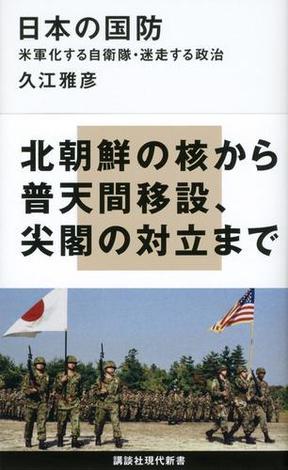- Amazon.co.jp ・本 (208ページ)
- / ISBN・EAN: 9784061498181
作品紹介・あらすじ
日本政府は米国の攻勢にボールを投げ返せないまま、受け身の姿勢に終始してきた。…さまざまな構想が米国側から提示されたにもかかわらず、日本政府は「何ら具体的な提案はない」「米国と自由な意見交換をしている」と繰り返し、提案の内容を公式には一切伏せてきたのである。…政治が総力をあげて取り組んできた形跡もなく、交渉にのぞんだごく一握りの官僚たちの場当たり的な対応が、問題を複雑にし、協議を長期化させた。国民の目に触れることのない密室で、どのような攻防が繰り広げられてきたのだろうか。隠された全容に迫る驚愕のドキュメント。
感想・レビュー・書評
-
詳細をみるコメント0件をすべて表示
-
『ぼくらの頭脳の鍛え方』
文庫&新書百冊(佐藤優選)161
国家・政治・社会 -
本書は、2003年時点でのアメリカブッシュ政権と日本の小泉政権の、米軍再編による日米関係の詳細をまとめ、2005年に発行された新書である。もう6年も前の話であるが、現在のアメリカのオバマ政権と日本の民主党との間で繰り広げられている沖縄米軍基地の再編問題は、単に現在の基地問題ではなく、複雑なこれまでの歴史的経緯があることを教えてくれる書であると思った。ただ、文章は専門的過ぎてわかりにくい。
本書では、世界軍事費の2位~10位までをあわせた金額よりも多い膨大な軍事費を支出するアメリカの軍事戦略の変更とそれに基づく世界規模の軍事態勢の再編成とそれに翻弄される日本の当時の小泉政権の対応を描き出している。そういえば、当時イラク戦争への小泉政権の前のめりの姿勢を思い起こす。
現在まで続いている沖縄の普天間基地の辺野古移設問題が、1996年の日米合意からはじまった経緯も詳細に書かれている。この問題はいまだに解決の糸口もないことを思うと、問題の根の深さを確認させられる思いがした。
本書で沖縄における再編問題の詳細を読むと、現在の出口が見えない沖縄基地問題の全体像がわかるが、アメリカの世界戦略の変更にあたって米軍を再編することによる沖縄で基地移転問題は行き詰っている。これは基地問題という視点で見ると解決の方法はないのではないのかと思った。日米関係はどうあるべきかという視点で、過去の延長線上ではない関係を模索しないと解決しないのだろうとも感じた。
それにしても、本書における「外務省と防衛庁の綱引き」は、実に日本的であるとも思った。外務省の安保条約の解釈をめぐる認識と防衛庁の軍事的論理の認識の差。それをコントロールすることができない政治家の実態は、「縦割り行政」そのものではないのか。日本において、官僚の優秀さと部門部門の官僚が自分の領域の最適政策のみに固執する欠陥はすべての領域にあるのではないかと感じた。
本書は、現在の沖縄における基地問題の根の深さを学習できる本として2005年の発行にもかかわらず現在でも充分に読むに耐える本であると思ったが、内容がすし詰めでわかりにくいことと、いわゆる「防衛利権」についての言及が一切ない点は、ちょっと物足りないと思った。 -
2005年出版。実は再編案が日米で最終的にとりまとめられたのは翌年なので、本書ではその部分の結論は欠いているが、大枠はカバーされている。日本側では基地問題に焦点があたり、地元との関係や国内政局のため、より大きな同盟のあり方も含め次々提案してくる米側に対して主体的に対応できなかったというのが基本的構図。
-
[ 内容 ]
日本政府は米国の攻勢にボールを投げ返せないまま、受け身の姿勢に終始してきた。
…さまざまな構想が米国側から提示されたにもかかわらず、日本政府は「何ら具体的な提案はない」「米国と自由な意見交換をしている」と繰り返し、提案の内容を公式には一切伏せてきたのである。
…政治が総力をあげて取り組んできた形跡もなく、交渉にのぞんだごく一握りの官僚たちの場当たり的な対応が、問題を複雑にし、協議を長期化させた。
国民の目に触れることのない密室で、どのような攻防が繰り広げられてきたのだろうか。
隠された全容に迫る驚愕のドキュメント。
[ 目次 ]
序章 伏せられた宿命の論点
第1章 パラダイムが変わった
第2章 米陸軍第一軍団司令部とは何か
第3章 米国が見せた沖縄への「配慮」
第4章 深まる亀裂
第5章 外務省と防衛庁の綱引き
第6章 リセット
終章 日本の政治的意志はどこにあるのか?
[ POP ]
[ おすすめ度 ]
☆☆☆☆☆☆☆ おすすめ度
☆☆☆☆☆☆☆ 文章
☆☆☆☆☆☆☆ ストーリー
☆☆☆☆☆☆☆ メッセージ性
☆☆☆☆☆☆☆ 冒険性
☆☆☆☆☆☆☆ 読後の個人的な満足度
共感度(空振り三振・一部・参った!)
読書の速度(時間がかかった・普通・一気に読んだ)
[ 関連図書 ]
[ 参考となる書評 ] -
ゼミの最終発表のテーマを「基地問題」にし、
そのために知識を付けようと思って読んだこの1冊。
これを読めば、基地問題の概要とその裏側そしてからくりまで分かると思う。
発表までに後3回は読むであろうこの1冊。
お世話になります。 -
この問題の入門書としては良い。
-
2001年9月11日の米国中枢同時テロ後、米国は対テロ戦争に突入する。伝統的な国家間の抑止に対応するのみならず、対テロの抑止策として防衛力を太平洋地域まで延長する米軍再編が、ラムズフェルドの描く構想である。よって、韓国の米軍再編、日本の米軍再編にまで及び、陸軍第一軍団司令部のキャンプ座間への移転、横田基地の米第五空軍司令部をグアムの第十三司令部へ移転する構想を決定。
前半は国防総省のラムズフェルド長官の米軍再編ーートランスフォーメーションのあり方の説明で、これは、江畑謙介の「米軍再編」の方が、詳しくかかれていて分りやすかった。トランスフォーメーションは、「脅威ベース」から「能力ベース」への軍事力の変革を意味する。スティルスや無人偵察機戸と特殊部隊のあり方が情報技術によって「敵」に対する即応性による軍隊の編成をまったく変えることを意味する。米軍の基地の再配置は、「再編」と捕らえるべき。 著者の久江雅彦は防衛庁、外務省担当のジャーナリストである。後半の防衛庁と外務省の綱引きは、両省庁を観察してきた著者ならではの見方だろう。外務省は、安全保障条約の所謂、極東条項の遵守、防衛庁は、それを超えた活動によって、極東の安全を保証するという「寄与米軍」という思考で対立する。
日本どこと対応していいのかわから無いという米国側の不満がぶつけられるのは政府の「国家意思」を媒介にした政府となっていないことが原因だとする。
米軍再編の国防省と国務省、防衛庁と外務省の対応を、マスメディアのからの断片的表面的知識だけでは、満足できない向きにはコンパクトに纏まっていて、良書だと思う。本書にも記載のあるワシントンポストの2+2の防御領域に台湾を含むことのすっぱ抜き記事。
Japan to Join U.S. Policy on Taiwan
Growth of China Seen Behind Shift
By Anthony Faiola
Washington Post Foreign Service
Friday, February 18, 2005;
TOKYO, Feb. 17 -- The United States and Japan will declare Saturday for the first time in a joint agreement that Taiwan is a mutual security concern, according to a draft of the document. Analysts called the move a demonstration of Japan's willingness to confront the rapidly growing might of China.
The United States has long focused attention on the Chinese government's threat to use military force against Taiwan if the island, which China views as a renegade province, moves toward independence. Until now, Japan has been content to let the United States bear the brunt of Beijing's displeasure.
But in the most significant alteration since 1996 to the U.S.-Japan Security Alliance, which remains the cornerstone of U.S. interests in East Asia, Japan will join the Bush administration in identifying security in the Taiwan Strait as a "common strategic objective." Set for release after a meeting of Secretary of State Condoleezza Rice, Defense Secretary Donald H. Rumsfeld and their Japanese counterparts in Washington on Saturday, the revisions will also call for Japan to take a greater role in conjunction with U.S. forces both in Asia and beyond, according to a draft copy obtained by The Washington Post.
Although it is likely to anger China, the move is being welcomed by Taiwan, which, despite having been occupied by Japan from 1895 to 1945, maintains an empathy for the Japanese that is rare in Asia. Elderly Taiwanese, for instance, still show delight in Japanese language and culture. Last month, Taiwan inaugurated its $3 billion, Japanese-built bullet train, which can reach speeds of almost 200 miles per hour. And in December, Japan angered China by granting a tourist visa to former Taiwanese president Lee Teng-hui, who was educated in Japan and had an emotional reunion here with a former professor.
"This is the first time that Japan has made its stance clear; in the past, Japan has been very indirect on the Taiwan issue," said Koh Se-kai, Taiwan's special representative to Japan, which since 1972 has had formal relations with China but not with Taiwan. "We're relieved that Japan has become more assertive."
Japan's constitution, drafted by the United States at the end of World War II, prohibits the country from going to war. But there is strong pressure to revise the constitution so that Japan's Self-Defense Forces can act as a real military.
Along with the threat of North Korea, which declared itself a nuclear-armed nation last week, the rise of China has become the primary concern fueling Japan's shift away from nearly six decades of pacifism.
Japan has generally been inclined to sidestep conflict with China. But in recent years, China has dramatically modernized its military while expanding its sphere of influence in Asia on the strength of its booming economy. The effort to extend its reach has included exploring for natural gas near Japanese-claimed waters only 110 miles north of Taiwan and countering Japan's claims to exclusive economic zones in the Pacific.
In response, Japan has also shifted course in the past year, moving to defend its territorial claims in the East China Sea. Last November, Japan dispatched aircraft on a two-day hunt for a Han-class Chinese submarine that briefly intruded into Japan's far southern waters in what many here saw as a test of Japanese resolve in the event of Chinese aggression against Taiwan.
"It would be wrong for us to send a signal to China that the United States and Japan will watch and tolerate China's military invasion of Taiwan," said Shinzo Abe, the acting secretary general of Japan's ruling Liberal Democratic Party who is widely considered a likely successor to Junichiro Koizumi as prime minister. "If the situation surrounding Japan threatens our security, Japan can provide U.S. forces with support."
Such talk reflects what diplomats and scholars call the defining drama of East Asia for the 21st century -- the competition for economic and political dominance in the region between Japan, the world's second-largest economy, and China, the world's most populous nation and a fast-developing economic and military power.
"I think the biggest challenge to Japan is going to be how it arranges its relationship with China," the U.S. ambassador to Japan, Howard H. Baker Jr., said on Wednesday. "But how they do that is going to say a lot about stability in this region for years to come. . . . Japan is a superpower; China is on its way to being a superpower. They are both rich, they both have a history and tradition in this region, and they don't much like each other, I think."
Analysts note that both China and Japan have substantial reasons for restraint. Last year, China surpassed the United States as Japan's number one trading partner, while massive investments by Japanese companies in search of cheaper labor and larger markets have become a driving factor behind China's blistering 9.5-percent annual growth rate.
But if their economic relations are hot, politically the two nations are cool. The Chinese complain about Koizumi's visits to Tokyo's Yasukuni Shrine commemorating fallen warriors -- including World War II war criminals. The two governments have also battled over the route of a trans-Siberian pipeline for Russian oil and territorial rights in an East China Sea island chain known as the Senkaku in Japanese and the Diaoyu in Chinese.
The Chinese government granted rights two years ago for domestic and foreign oil companies to explore and drill an area only three miles from Japanese-claimed territory -- a region rich in natural gas and oil. This month, Japan pushed back, boosting its claims to the area by officially taking over ownership of a 15-foot lighthouse built on the island chain by Japanese nationalist activists in 1978.
"It is time Japan began protecting what is ours," said Makoto Yamazaki, director of the Japan Youth Association, which built the lighthouse and freely handed it over to the government this month. "If our sovereignty is being threatened, we have a right to defend ourselves."
But the idea of Japanese military cooperation with the United States in the sea lanes north of Taiwan has particularly rankled Chinese diplomatic and military planners because it goes to the heart of their Taiwan strategy.
On the one hand, diplomats and other specialists say, the Chinese military has embarked on a buildup of short-range missiles, naval vessels and electronics-aided aircraft to enable it to threaten the island militarily if President Chen Shui-bian should take what China considers an unacceptably decisive step toward independence. On the other hand, they added, China has set out to improve and extend its maritime and airborne might in the sea lanes north of Taiwan, with the goal of forcing the United States to think twice about military intervention. Within the next five years, according to U.S. estimates, the Chinese navy is expected to have more than 20 modern attack submarines, including half a dozen nuclear-powered vessels.
Japanese officials said that the official position advocating a peaceful resolution of the Taiwan issue has not changed. They said the constitution limits the level of assistance that Japan could offer in the event of a U.S. confrontation with China over Taiwan. But the joint statement on Saturday could help lay the groundwork for the Japanese to extend as much cooperation as they legally can, including logistical support such as transportation and medical rescue operations behind the lines of combat, officials said.
"We consider China a friendly country, but it is also unpredictable," a senior Japanese government official said. "If it takes aggressive action, Japan cannot just stand by and watch."
Correspondent Edward Cody in Beijing and special correspondents Sachiko Sakamaki and Akiko Yamamoto contributed to this report.
-
読み始めたところです。
今ひとつピンとこない感じ。。
著者プロフィール
久江雅彦の作品










 本棚登録 :
本棚登録 :  感想 :
感想 : 










